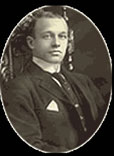Home > Nahant > Poems by Nahant Residents
Nahant: Poetry by the Sea
CHARLES HAMMOND GIBSON JR.
 CHARLES HAMMOND GIBSON JR. (1874 – 1954)
summered in Nahant at East Point, overlooking the water near
Forty Steps Beach. As a horticulturalist, his rose gardens
were regionally renown, and many people came to Nahant to see
them the one time a year when they were open to the public. As
a preservationist, Gibson is responsible for the Gibson
House Museum, opened in 1957 to keep alive the Victorian era he remembered
from his youth. Located in Boston at 137 Beacon St.,
and designated a National Historical Landmark by the National
Park Service, the Gibson House Museum enables the public to
see a four story, single family, brick and brownstone Victorian
town house as it was furnished and decorated over a century
ago. As an eccentric, Charles Hammond Gibson Jr. often
dressed in a formal coat, spats, and cane, long after they
had fallen from fashion, and while in Boston, he left the house
for dinner at the Ritz precisely at six o’clock, usually
wearing a full-length fur coat. As a poet, he wrote verse
throughout his life, self-publishing three books, including The
Spirit of Love and Other Poems in 1906. “The
Forty Steps,” composed at the Gibson House four months
after D-Day during World War II, will remind its readers of
the gun placements near Forty Steps during World War II and
also of the image of Nahant as a place of peace.
CHARLES HAMMOND GIBSON JR. (1874 – 1954)
summered in Nahant at East Point, overlooking the water near
Forty Steps Beach. As a horticulturalist, his rose gardens
were regionally renown, and many people came to Nahant to see
them the one time a year when they were open to the public. As
a preservationist, Gibson is responsible for the Gibson
House Museum, opened in 1957 to keep alive the Victorian era he remembered
from his youth. Located in Boston at 137 Beacon St.,
and designated a National Historical Landmark by the National
Park Service, the Gibson House Museum enables the public to
see a four story, single family, brick and brownstone Victorian
town house as it was furnished and decorated over a century
ago. As an eccentric, Charles Hammond Gibson Jr. often
dressed in a formal coat, spats, and cane, long after they
had fallen from fashion, and while in Boston, he left the house
for dinner at the Ritz precisely at six o’clock, usually
wearing a full-length fur coat. As a poet, he wrote verse
throughout his life, self-publishing three books, including The
Spirit of Love and Other Poems in 1906. “The
Forty Steps,” composed at the Gibson House four months
after D-Day during World War II, will remind its readers of
the gun placements near Forty Steps during World War II and
also of the image of Nahant as a place of peace.
| |
I.
Once
Forty Steps; now thirty nine –
And
they in doubtful state,
Like
ravished riches in decline,
The
blasting of the great.
II.
Yet
God has blessed the sacred spot,
Now
touched by time and war,
While
echoing the cannon’s shot
Beyond
the ocean’s roar.
III.
Once
peopled by a stately throng,
That
bathed upon the shore,
Now
to the poet still belong
Their
annals and their lore.
IV.
O
footprints of an age outworn
By
fickle time and tide,
Your
hallowed dust lies all but gone,
Its
grandeur and its pride.
V.
Today
a soldier’s martial tread
Guards
what is now no more,
The
gaiety from laughter bred,
The
peace – that led to war. |
from: typewritten manuscript archived at The Nahant Historical Society
courtesy: Gibson House